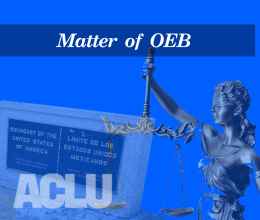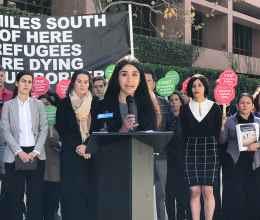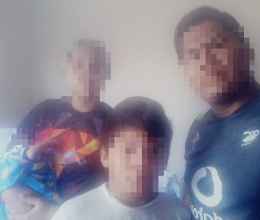SAN DIEGO – The ACLU and law firm of Latham & Watkins today petitioned the federal court to conduct a long-overdue naturalization hearing for deported U.S. Army veteran Hector Barajas, who received an honorable discharge after serving nearly six years in the military.
Barajas, a decorated veteran and founder of the Deported Veterans Support House in Tijuana, Mexico, was granted a full pardon last year by Gov. Jerry Brown for a conviction that led to his deportation. But U.S. Citizenship and Immigration Services (USCIS) has not issued a decision on his naturalization application, even though Barajas successfully completed the required portions of the process in November, 2016. According to regulation, that decision was supposed to be issued within 120 days, a deadline that has long passed.
In taking this court action, the ACLU Foundations of Southern California and San Diego & Imperial Counties, and Latham & Watkins ask that the U.S. District Court take over the matter and conduct a naturalization hearing for Barajas.
“Hector Barajas is a model citizen, who is not only legally entitled to naturalize as a U.S. citizen but has earned respect and admiration for his tireless leadership and service worldwide. USCIS’s delay in processing his naturalization application is inexplicable and unfair,” said Jennie Pasquarella, director of immigrants’ rights and a senior staff attorney for the ACLU of Southern California. “It is time for Hector to come home.”
Barajas, 40, was born in Mexico but raised since he was seven in the Los Angeles area. In 1992, he became a lawful permanent resident. After graduating from high school, Barajas enlisted in the army in 1995 and could have applied for naturalization at that time, but army recruiters led him to the mistaken impression that honorable service in the military automatically made him a citizen.
During his military career, Barajas reached the rank of specialist and served in the 82nd Airborne Division. He received numerous accolades and awards, including the Army Commendation Medal and Humanitarian Service Medal. He was honorably discharged in 2001.
Barajas struggled upon his re-entry to civilian life and entered a plea of no contest in 2002 to a charge of shooting at an occupied vehicle. After spending two years in prison and nearly a year in detention, he was deported to Mexico. With his family in the U.S. and difficulties finding employment in Mexico, he re-entered the U.S. and was again deported in 2010 after being pulled over in a traffic stop.
Since that time, Barajas has devoted his life to helping other deported military veterans. He founded the Departed Veterans Support House, which provides housing, social services and legal resources for veterans. He has been a tireless advocate for deported veterans, and his work has earned the support of members of Congress and other state and local elected officials. In April 2017, Gov. Brown pardoned him, issuing a statement that said Barajas “has shown that since his release from custody, he has lived an honest and upright life, exhibited good moral character and conducted himself as a law-abiding citizen.”
The statement went on to mention Barajas’ work with the Deported Veterans Support House and said he “has paid his debt to society and earned a full and unconditional pardon.”
James A. Erselius, an attorney with Latham & Watkins in San Diego, said: “Under U.S. regulations, Hector is eligible for naturalization due to his honorable service in the military during a time of hostilities and his good moral character. Hector’s work as a champion for deported veterans is without parallel and demonstrates not only his character but his deep commitment to service and to the United States.”
Upon passing the English and civic portions of his naturalization requirements on November 18, 2016, Barajas was supposed to receive a determination on his application within 120 days. That deadline passed on March 18, 2017 and to this point no decision has been issued.
“Despite my deportation, I have never stopped feeling in my heart that I am American,” Hector said. “I have devoted my life to the United States and its veterans. All I want is to be home with my family and my daughter. I have been waiting for a year and a half for resolution of my naturalization application and am hopeful that this lawsuit will propel a swift decision.”
In the court complaint filed today, it is noted that the court has jurisdiction to conduct a hearing and make a determination on Barajas’ naturalization application.
Read the court complaint here.
ACLU Demands Naturalization Hearing for Deported Veteran Hector Barajas
Related Issues
Related content

Lagleva et al. v. Doyle
October 14, 2021ACLU, Jewish Family Service Respond to OIG Review of U.S. Border...
July 26, 2021
Matter of O.E.B.
May 25, 2021
Immigrants’ Rights and Detention
August 13, 2020
Jewish Family Service & ACLU File Complaint After DHS Expels...
July 10, 2020ACLU Statement on First Known Death from COVID-19 in ICE Detention
May 6, 2020
Suit Filed to Drastically Reduce Number of People in U.S. Marshals’...
April 24, 2020
ACLU Sues for Drastic Reduction in Population of Overcrowded Otay...
April 21, 2020
